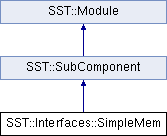SST::Interfaces::SimpleMem Class Referenceabstract
Simplified, generic interface to Memory models. More...
#include <simpleMem.h>
Inheritance diagram for SST::Interfaces::SimpleMem:

Data Structures | |
| class | Handler |
| Event Handler class with user-data argument. More... | |
| class | Handler< classT, void > |
| Event Handler class without user-data. More... | |
| class | HandlerBase |
| Functor classes for Clock handling. More... | |
| class | Request |
| Represents both memory requests and responses. More... | |
Public Types | |
| typedef uint64_t | Addr |
| All Addresses can be 64-bit. | |
Public Member Functions | |
| SimpleMem (SST::Component *comp, Params ¶ms) | |
| Constructor, designed to be used via 'loadSubComponent'. More... | |
| virtual bool | initialize (const std::string &linkName, HandlerBase *handler=NULL)=0 |
| Second half of building the interface. More... | |
| virtual void | sendInitData (Request *req)=0 |
| Sends a memory-based request during the init() phase. | |
| virtual void | sendInitData (SST::Event *ev) |
| Sends a generic Event during the init() phase (Mostly acts as a passthrough) More... | |
| virtual SST::Event * | recvInitData () |
| Receive any data during the init() phase. More... | |
| virtual SST::Link * | getLink (void) const =0 |
| Returns a handle to the underlying SST::Link. | |
| virtual void | sendRequest (Request *req)=0 |
| Send a Request to the other side of the link. | |
| virtual Request * | recvResponse (void)=0 |
| Receive a Request response from the side of the link. More... | |
 Public Member Functions inherited from SST::SubComponent Public Member Functions inherited from SST::SubComponent | |
| SubComponent (Component *parent) | |
| virtual void | init (unsigned int phase) |
| Used during the init phase. More... | |
| virtual void | setup () |
| Called after all components have been constructed and inialization has completed, but before simulation time has begun. More... | |
| virtual void | finish () |
| Called after simulation completes, but before objects are destroyed. More... | |
Additional Inherited Members | |
 Protected Member Functions inherited from SST::SubComponent Protected Member Functions inherited from SST::SubComponent | |
| bool | isPortConnected (const std::string &name) const |
| Determine if a port name is connected to any links. | |
| Link * | configureLink (std::string name, TimeConverter *time_base, Event::HandlerBase *handler=NULL) |
| Configure a Link. More... | |
| Link * | configureLink (std::string name, std::string time_base, Event::HandlerBase *handler=NULL) |
| Configure a Link. More... | |
| Link * | configureLink (std::string name, Event::HandlerBase *handler=NULL) |
| Configure a Link. More... | |
| Link * | configureSelfLink (std::string name, TimeConverter *time_base, Event::HandlerBase *handler=NULL) |
| Configure a SelfLink (Loopback link) More... | |
| Link * | configureSelfLink (std::string name, std::string time_base, Event::HandlerBase *handler=NULL) |
| Configure a SelfLink (Loopback link) More... | |
| Link * | configureSelfLink (std::string name, Event::HandlerBase *handler=NULL) |
| Configure a SelfLink (Loopback link) More... | |
| bool | doesSubComponentInfoStatisticExist (std::string statisticName) |
| template<typename T > | |
| Statistic< T > * | registerStatistic (std::string statName, std::string statSubId="") |
| TimeConverter * | registerClock (std::string freq, Clock::HandlerBase *handler) |
| Registers a clock for this component. More... | |
| TimeConverter * | registerClock (const UnitAlgebra &freq, Clock::HandlerBase *handler) |
| void | unregisterClock (TimeConverter *tc, Clock::HandlerBase *handler) |
| Removes a clock handler from the component. | |
| Cycle_t | reregisterClock (TimeConverter *freq, Clock::HandlerBase *handler) |
| Reactivates an existing Clock and Handler. More... | |
| Cycle_t | getNextClockCycle (TimeConverter *freq) |
| Returns the next Cycle that the TimeConverter would fire. | |
| TimeConverter * | getTimeConverter (const std::string &base) |
| TimeConverter * | getTimeConverter (const UnitAlgebra &base) |
| SimTime_t | getCurrentSimTime (TimeConverter *tc) const |
| return the time since the simulation began in units specified by the parameter. More... | |
| SimTime_t | getCurrentSimTime (std::string base) |
| return the time since the simulation began in timebase specified More... | |
| SimTime_t | getCurrentSimTimeNano () const |
| Utility function to return the time since the simulation began in nanoseconds. | |
| SimTime_t | getCurrentSimTimeMicro () const |
| Utility function to return the time since the simulation began in microseconds. | |
| SimTime_t | getCurrentSimTimeMilli () const |
| Utility function to return the time since the simulation began in milliseconds. | |
| Module * | loadModule (std::string type, Params ¶ms) |
| Module * | loadModuleWithComponent (std::string type, Params ¶ms) |
| SubComponent * | loadSubComponent (std::string type, Params ¶ms) |
| SharedRegion * | getLocalSharedRegion (const std::string &key, size_t size) |
| Find a lookup table. | |
| SharedRegion * | getGlobalSharedRegion (const std::string &key, size_t size, SharedRegionMerger *merger=NULL) |
 Protected Attributes inherited from SST::SubComponent Protected Attributes inherited from SST::SubComponent | |
| Component *const | parent |
Detailed Description
Simplified, generic interface to Memory models.
Constructor & Destructor Documentation
|
inline |
Constructor, designed to be used via 'loadSubComponent'.
Member Function Documentation
|
pure virtual |
Second half of building the interface.
Intialize with link name name, and handler, if any
- Returns
- true if the link was able to be configured.
|
inlinevirtual |
Receive any data during the init() phase.
- See also
- SST::Link::recvInitData()
References getLink(), and SST::Link::recvInitData().
|
pure virtual |
|
inlinevirtual |
Sends a generic Event during the init() phase (Mostly acts as a passthrough)
- See also
- SST::Link::sendInitData()
References getLink(), and SST::Link::sendInitData().
The documentation for this class was generated from the following file:
- src/sst/core/interfaces/simpleMem.h
